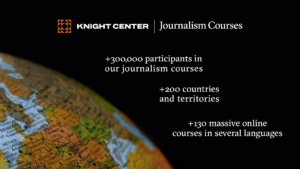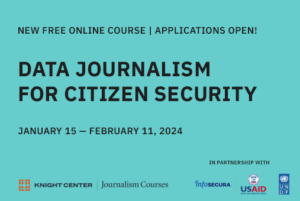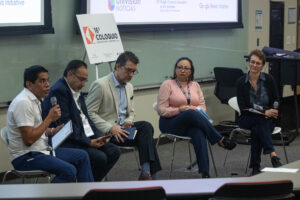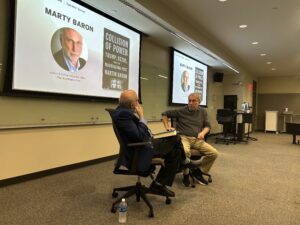With the mainstreaming of artificial intelligence (AI) and hype over generative AI programs like ChatGPT making headlines in 2023, the Knight Center for Journalism in the Americas helped lead the push to train journalists on what AI is and how it can best be used in newsrooms. This was one of the highlights of another productive year for the Knight Center’s programs to strengthen quality journalism around the world.
 Recognizing how rapidly AI technologies are evolving, and that now is the time for journalists to understand AI’s opportunities–and pitfalls– so they aren’t caught unprepared, the Knight Center created a series of initiatives aimed at helping thousands of journalists from around the world to understand the impacts and implications of generative AI on their work, their newsrooms and the industry at large.
Recognizing how rapidly AI technologies are evolving, and that now is the time for journalists to understand AI’s opportunities–and pitfalls– so they aren’t caught unprepared, the Knight Center created a series of initiatives aimed at helping thousands of journalists from around the world to understand the impacts and implications of generative AI on their work, their newsrooms and the industry at large.
Through four instructor-led online courses, three self-directed courses, a multilingual webinar and the panel “How can journalism incorporate AI, including generative tools like ChatGPT and Bard, to improve production and distribution of news?” at the 2023 International Symposium on Online Journalism (ISOJ), the Knight Center was at the forefront of this latest technological, journalistic and societal trend.
This also was a year of growth and change for the Knight Center. Most notably, in 2023 we surpassed the 300,000 participant mark in the number of people trained through our pioneering massive online courses program since it began in 2012.

This year the Knight Center started expanding its activities and nearly doubled the size of our full-time professional staff from 5 to 9, thanks to the 5-year, $4 million grant from the Knight Foundation. We said goodbye to Mallary Tenore, who, after six years as the Knight Center’s assistant and then associate director, left to take a full-time teaching position at the University of Texas at Austin (UT). She was replaced by Knight Center alumna and UT visiting Associate Professor Summer Harlow, a former journalist who worked at the Knight Center while she earned her Master’s degree in Latin American Studies and her Ph.D. in Journalism.
Other big changes as 2023 closes out include the ongoing revamping of our websites and distance learning platform, as well as consolidation of our various social media accounts. Our Journalism Courses account on X (formerly Twitter) has merged with our main Knight Center account. Be sure to follow us at @KnightCenterUT for the latest news about our online course offerings. We also merged accounts on Facebook; you can now find all information related to our journalism courses as well as general Knight Center news at www.facebook.com/utknightcenter. Our LinkedIn and Instagram accounts will continue to offer everything you need to know about our online courses and other Knight Center happenings. The Facebook, X (Twitter), and Instagram accounts for our digital magazine, LatAm Journalism Review, remain unchanged and you can still visit them to find original reporting on press freedom and journalism innovation in Latin America and the Caribbean.
As we reflect on the past year, it is with great pride and enthusiasm that we share some of the Knight Center’s remarkable achievements, made possible thanks to the generous support of our funders, and the contributions of our partners and everyone who took part in our programs.
Here are some of our highlights from 2023:
Online Courses
Over the last decade, our commitment to excellence in journalism has resulted in a major milestone realized in 2023: our massive online courses have successfully reached more than 300,000 participants from 200 countries and territories.
In 2023 alone, the Knight Center offered 12 online courses that reached more than 21,000 people from more than 170 countries. Offered in English, Spanish, Portuguese and French, these courses were taught by leading experts in journalism, technology, and press freedom. We partnered with organizations like UNESCO, Solutions Journalism Network, Tornavoz, and Hacks/Hackers to make these courses possible.
Additionally, we added eight self-directed courses (three in English, three in Portuguese, one in Spanish, and one in Arabic) to our course library, freely available at JournalismCourses.org.
 As part of our efforts to train journalists on AI, this past year we offered what turned out to be one of the most popular courses in Knight Center history: “How to use ChatGPT and other generative AI tools in your newsrooms,” led by Aimee Rinehart of the AP and Sil Hamilton of Hacks/Hackers, was a free multilingual course in English, Spanish, and Portuguese that attracted more than 10,000 students from 150-plus countries. Self-directed versions of those courses are now available in English, Spanish, and Portuguese. Building on the success of those massive, open online courses (MOOCs), we also offered a smaller paid course, “Generative AI for journalists: Discovering what data can do,” that served as a more advanced sequel to the MOOC to give participants hands-on skills.
As part of our efforts to train journalists on AI, this past year we offered what turned out to be one of the most popular courses in Knight Center history: “How to use ChatGPT and other generative AI tools in your newsrooms,” led by Aimee Rinehart of the AP and Sil Hamilton of Hacks/Hackers, was a free multilingual course in English, Spanish, and Portuguese that attracted more than 10,000 students from 150-plus countries. Self-directed versions of those courses are now available in English, Spanish, and Portuguese. Building on the success of those massive, open online courses (MOOCs), we also offered a smaller paid course, “Generative AI for journalists: Discovering what data can do,” that served as a more advanced sequel to the MOOC to give participants hands-on skills.
We also held a multilingual webinar, "Generative AI: What journalists should know about ChatGPT and other tools." The live webinar reached 900 unique viewers, and the YouTube videos of the webinar in English, Spanish, and Portuguese have already garnered more than 8,000 views.
The Knight Center also offered classes on explanatory journalism, data journalism, solutions journalism, digital investigations, product thinking, and ways journalists can protect themselves from judicial harassment. We also are pleased that we were able to offer, for the first time, a Portuguese-language version of the “International Legal Framework of Freedom of Expression” course. This program, sponsored by UNESCO, is one that the Knight Center has offered in Spanish eight times since 2014, reaching more than 12,000 judges, prosecutors and other judicial operators. It was so successful in Latin America that it was used as a model to create similar courses in Africa and Asia.

Looking ahead to the new year, we already have an impressive slate of new online courses lined up, on everything from freedom of expression and elections to how to use Python in your newsroom. You can register now for our first course of the year, “Data Journalism for Citizen Security,” which will be offered Jan. 15-Feb. 11, 2024, in English and Spanish. That program is offered by the Knight Center in partnership with UNDP’s Infosegura Regional Project and with support from the United States Agency for International Development (USAID).
International Symposium on Online Journalism
More than 1,100 people attended the 24th annual ISOJ on April 14-15, and like the previous year, this global conference was held online and in-person at the University of Texas at Austin. The hybrid event attracted 380 people to Austin from 29 countries, and more than 800 people from 89 countries participated online, taking advantage of innovative ways to engage with the speakers and other attendees.
This year’s ISOJ featured 76 speakers from 18 countries and 20 hours of programming, including 10 panels, four keynote presentations and six workshops. The Knight Foundation and Google News Initiative were this year’s major sponsors, and UT’s Moody College of Communication, Univision Noticias, Newspack by Automattic, and the Content Authenticity Initiative also provided support.

Members of the ISOJ panel “How to improve the coverage of the climate crisis and avoid the ‘Don’t Look Up’ scenario” react to the ISOJ 2023 audience. (Patricia Lim/Knight Center)
Panelists addressed pressing topics like the impact of generative artificial intelligence on journalism, sustainability of local news, covering the climate crisis, reporting from exile, building successful journalism business models and combating misinformation. Speakers included Joseph Kahn, executive editor at The New York Times; Janelle Rodriguez, executive vice president, NBC News; Jon Kelly, co-founder and editor-in-chief of Puck; and Yusuf Omar, co-founder of Seen.tv.
Since the pandemic, we are pleased to have been able to offer an online version of ISOJ to make it more accessible to people from around the world. This year, in what was our second hybrid conference, we went beyond just simply streaming, to try to create an engaging experience for remote attendees. Besides the traditional live video streaming of panels and workshops, we offered meet-and-greet sessions to give online participants the opportunity to interact with ISOJ speakers via video-conference. Remote attendees also could talk to each other through Shindig, a virtual conference platform that allowed participants to create video-chat rooms, replicating the networking experience of an in-person conference in the virtual environment.
We also published the 13th volume of the #ISOJ Journal, the official academic publication that is part of the conference’s research component. This year's journal, available here online, included five peer-reviewed articles. This was the last edition of the journal, which will no longer be published. All previous #ISOJ journals are still available in our archives.

Panel discussion on April 13, 2023 during ISOJ 2023 about the special screening, For the Record. (Patricia Lim/Knight Center)
For the first time, we held a documentary screening and Q&A as part of a pre-ISOJ event, “The Crisis of Rural Journalism in America.” This pre-ISOJ event, sponsored by the Rural Journalism Pipeline Project at UT Austin’s IC2 Institute and the Moody College School of Journalism and Media, featured a screening of the documentary “For the Record” and a panel discussion.
Archived videos of the 2023 ISOJ sessions can be accessed here. They’re also available on YouTube in English and in Spanish. On the ISOJ website, you can find videos, transcripts and other materials from all symposia, since 1999!
We hope you’ll mark your calendars for the next ISOJ, to be held April 12-13, 2024, at UT in Austin and online. This will be a special 25th anniversary ISOJ, so be sure to get your tickets when registration opens in January!
Ibero-American Colloquium on Digital Journalism
The day after ISOJ, we held the 16th Ibero-American Colloquium on Digital Journalism, in-person and online, to discuss press freedom, innovation, and other topics relevant to online journalism throughout the Ibero-America region. This Spanish-language conference convenes ISOJ participants from Latin America, Spain and Portugal. About 50 people attended in person at the University of Texas at Austin campus, and another 500 joined online.

Nicaraguan journalists speak at the 2023 Coloquio Iberoamericano. (Patricia Lim/Knight Center)
Sponsored by the Knight Foundation, Univision Noticias and Google News Initiative, the Colloquium featured 26 speakers across six panels about topics such as diversity in newsrooms, exiled Nicaraguan journalists and Venezuelan journalism after 25 years of Chavism. Speakers included Nicolas Rios, audiences and community director of Documented; Dagmar Thiel, director of Fundamedios; Juan Lorenzo Holmann, CEO of Nicaragua’s La Prensa; Luis Ernesto Blanco, editorial director of Runrun.es; Florencia Aza, director of strategic initiatives for SembraMedia, and others.
Recordings of the Colloquium panels are available in Spanish to watch on YouTube.
LatAm Journalism Review
The Knight Center’s reach and impact continue to grow thanks in part to its trilingual news magazine, LatAm Journalism Review (LJR), which features in-depth, original reporting on press freedom and journalism innovations in Latin America and the Caribbean. LJR also publishes a trilingual News Monitor that compiles headlines of the most important journalism and press freedom stories published by Latin American and Caribbean news organizations.

In 2023, LJR published 252 original stories (plus their translated versions), and averaged about 45 news monitor posts (plus their translations) each month. Below are some of the most important stories of the year:
“Closure of radio stations in Venezuela continues as news deserts grow”
“Threats from organized crime and government inaction in Ecuador prompt exile of journalists”
“Latin American journalists denounce the precariousness in the profession”
“José Rubén Zamora case: Guatemalan government's strategy to silence the press, according to experts”
“Fellowships, grants and opportunities open to Latin American journalists”
“Useful artificial intelligence resources for journalists”
Additionally, on Nov. 1, to correspond with the International Day to End Impunity for Crimes against Journalists, LJR published a special multimedia, trilingual project highlighting four cases of crimes against Latin American journalists that remain unpunished. That project, “#ENDIMPUNITY: Justice in crimes against Latin American journalists demands long fight,” has been viewed nearly 900 times in the month-and-a-half since it launched.
Please be sure to visit latamjournalismreview.org and subscribe to our weekly trilingual newsletter to stay on top of the latest news and headlines from Latin America and the Caribbean in 2024.
Speaker Series

Rosental Alves and Marty Baron in discussion as part of the Knight Center Speaker Series. (Teresa Mioli/Knight Center)
The Knight Center’s Speaker Series continued in 2023, with two book events held at the UT Austin campus. This year’s series kicked off on April 17 with Summer Harlow, then-Associate Professor at the University of Houston, who presented research from her new book, “Digital Native News: The Remaking of Latin American Mainstream and Alternative Journalism.” That talk was co-sponsored by UT’s Lozano Long Institute of Latin American Studies.
On Nov. 13, former Washington Post and Boston Globe editor Marty Baron spoke about his new book, “Collision of Power: Trump, Bezos, and The Washington Post,” in a sit-down discussion with Knight Center founder and director Rosental Calmon Alves.
Throughout the year, the Knight Center also co-sponsored other noteworthy events, such the 2023 Global Fusion Conference Sept. 22-24 at UT; the third Latin American Conference on Diversity in Journalism held online Oct. 20-21; and the second “More Women, Better Journalism” online conference organized by the Women in the News Network (WINN) Nov. 16.
Looking ahead
The diverse and dynamic programs that the Knight Center offers each year, and our free- and low-cost courses that have cultivated a community of learners passionate about journalism and its crucial role in shaping societies, are all possible thanks to support from our funders, partners and people like you.
We hope that you will continue to support us in the coming year. If you’re interested in making a year-end donation (which is tax-deductible for U.S. residents) to the Knight Center, you can do so here.
We extend our heartfelt gratitude to the Knight Foundation, which has been our main supporter for the last 21 years, and to everyone who has contributed to the success of the Knight Center for Journalism in the Americas. We are excited about the possibilities that lie ahead and we look forward to serving you in the new year! There are so many exciting things to come!